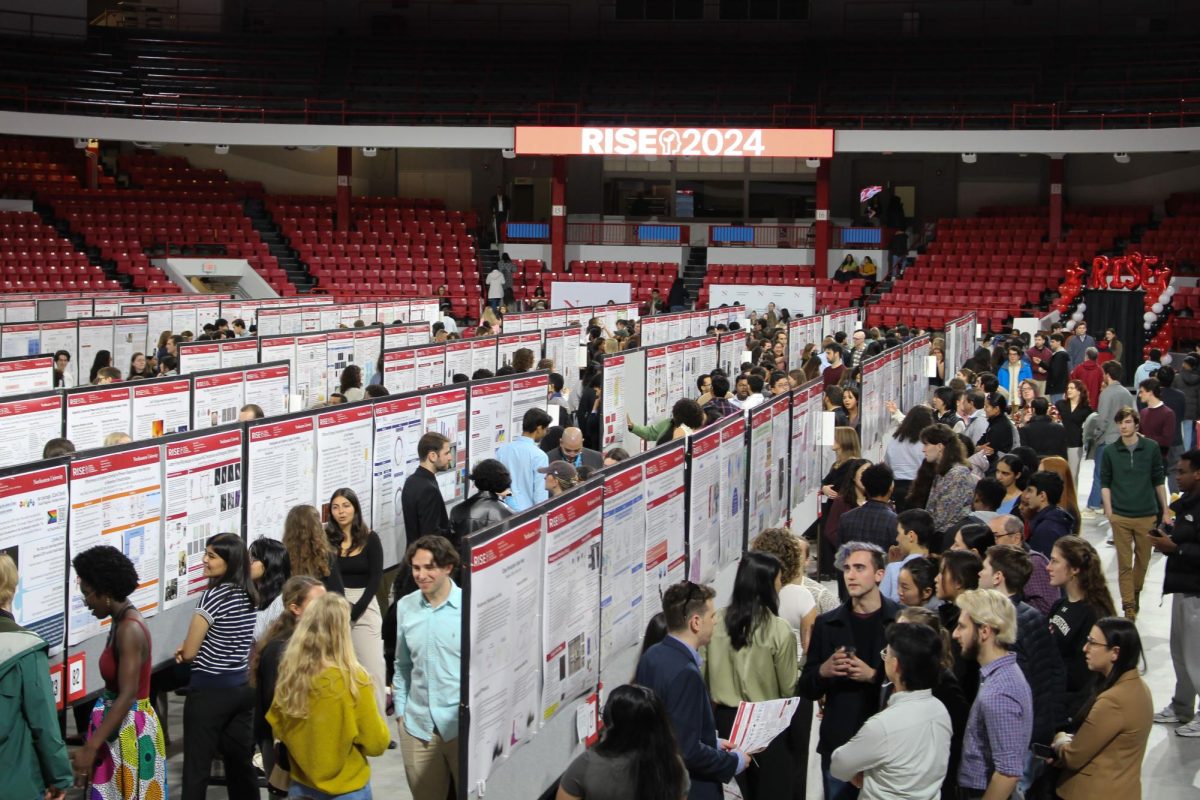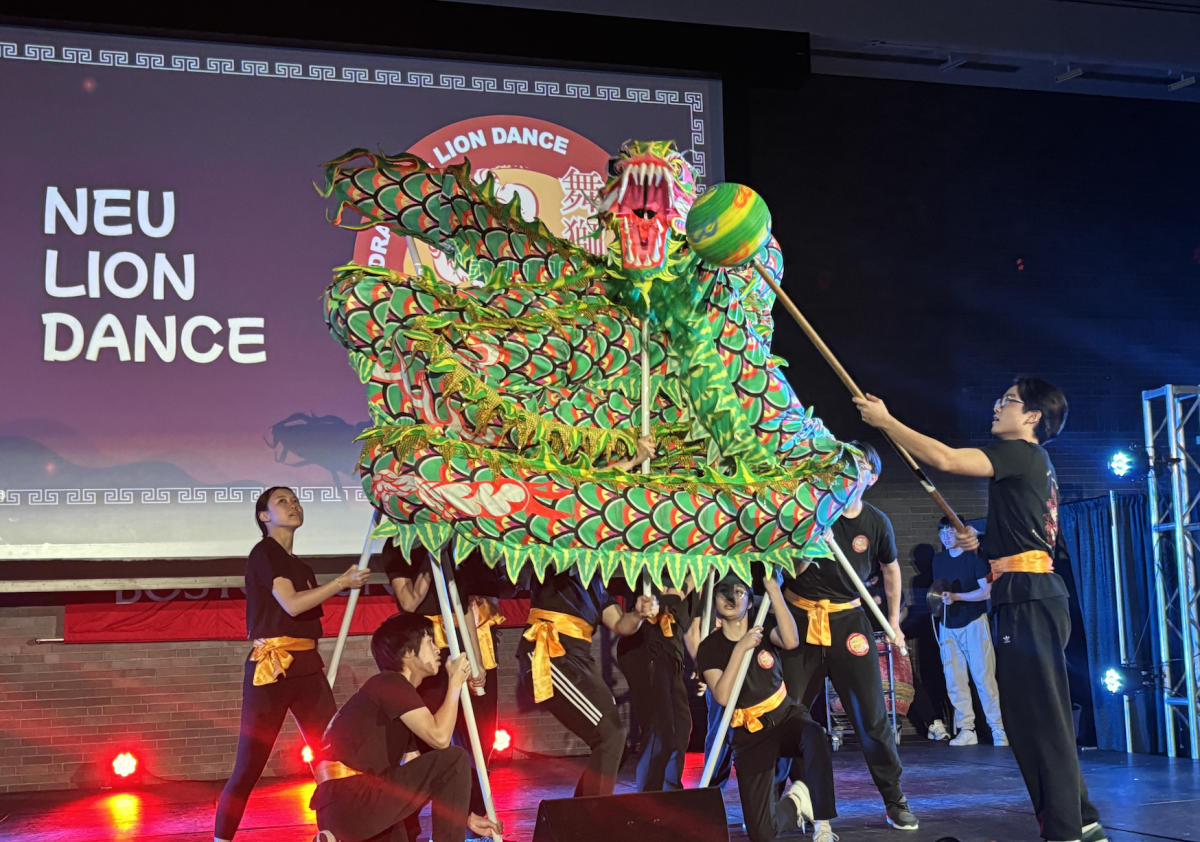
By Maxim Tamarov, News Staff
On Tuesday, Northeastern and the Ruderman Family Foundation hosted a panel of six members of the Israeli Knesset, representing five distinct political parties, in Blackman Auditorium.
The delegation’s goal was to address issues that affect Israeli and American Jewry: the debated borders of Palestinian land and the contested Israeli settlements in the region. The sold-out event garnered much attention, due to recent clashes on campus between Israeli supporters and Palestinian activists.
There was a heavy police presence in Blackman, with a coat and bag check implemented for the safety of the Knesset and attendees. A Students for Justice in Palestine (SJP) demonstration took place on Huntington Avenue prior to the event but no arrests were made, Boston Police Captain Al Sweeney said after the event.
“I’m a human rights believer. I believe in a peace process. I am a feminist,” Michal Rozin, a member of the Israeli Meretz Party, said during the panel. “I support the two state solution, because I care about Israel’s future. We cannot be an occupying nation.”
Some of the delegates did not agree with such a phrasing.
“[My party and I] absolutely refuse the widely used term: occupied territory. These areas are not occupied — they are under dispute,” Shulamit Mualem Rephaeli, member of the HaBayit HaYehudi (Jewish Home) party said.
Rephaeli related a story about how her husband was killed while serving in the army. She also said that she lived in a settlement, and interacted with Arabs there on a daily basis.
“We want Israel to be more Jewish and democratic. To not build in a settlement is not the right way to do; we are not occupiers.”
Shimon Ohayon, of the Likud Yisraeli (Israel is Our Home), spoke about the multitude of misinformation on the issue of Palestine.
“I must say that the Palestinians are using two languages,” he said. “In English they are speaking about peace — but in Arabic [they] say they will not make concessions.”
Members of the left wing were reluctant to dismiss Palestinian claims to land.
“We are among the pushers for the peace process with the Palestinians. It is not regular to continue conflict,” Shimon Solomon, of the Yesh Atid (There is a Future) party, said. “If we are to be realistic — I do not see another solution.”
After the delegates introduced themselves and their parties, they proceeded to answer questions that audience members had written on note cards.
“It was challenging to get politicians to stay in the time limit,” Kasey Kaufman, the moderator for the event, said. “You always have more questions than time will permit.”
Kaufman, a former news anchor and reporter for WBZ-TV, was proactive in making sure the panel got to as many audience questions as possible to allow a broader discussion.
One question from the audience addressed the issue of trading prisoners with the Palestinians for peace negotiations.
“We did pay. We all served in the army. We know what [the Palestinians] did,” Solomon said. He explained that all Israelis already sacrificed a lot, but that this was not enough to ensure good relations with Palestine. “We have to pay a high price to create peace.”
Ohayon, and other members of the right, contested this idea, saying that the release of known terrorists would only strengthen the bonds of sympathetic Palestinians.
Yet it was pointed out that not all of the Palestinians in the prisons were confirmed terrorists.
“We like to say they are all prisoners with blood on their hands. That is a lie,” Rozin said. “Some of [the Palestinians] we negotiate with used to sit in the prison 10, 20 years.”
Prisoners in Israel are automatically released after 20 years. The state does not implement a death penalty.
Another question dealt with the repercussions of emphasizing the Jewish aspect of Israel.
“In order to finally end this conflict, the Palestinians must accept a Jewish state,” said Nahman Shai, of the Avodah (Labor Party).
Solomon countered this, saying that such a distinction was unnecessary.
“We don’t need recognition from Palestinians,” he said. “We know who we are. We are Jewish. We are a strong country.”
But on the right, there was a consensus that the nation must be true to its Hebrew identity.
“It is very important to understand that Israel is a Jewish homeland,” Ohayon said. “There are over 20 Arab countries. They share the same religion, the same language, the same tradition — the same everything. For my Jewish people, one Jewish state you are not ready to accept?”
Afterwards, Jake Ruderman, of the Ruderman Foundation, complimented the organizations that helped the event run smoothly. He mentioned that it was not at all surprising that the event required so much police presence, saying, “Anywhere you have [the Knesset] speak, there is conflict.”
In an interview after the presentation, some of the delegates expressed their feelings about the experience at Northeastern.
“We met some of the students and had some discussions,” Ohayon said. “I learned about the diversity [of Jewish identity in America].”
Ohayon also pointed out that he encountered many opinions on the Palestinian prisoners from the students the delegation dined with, and that some were not favorable.
“They didn’t know the numbers and figures,” he said. “[The students thought] that we don’t treat [the Palestinians] nice.”
Itzik Shmuli of the Labor Party said, “We had been told we might meet students who want to have a demonstration. I’m fine with that. I hope they were here in the auditorium.”
But according to Ruderman, the event went well.
“We had a very open discussion. If anyone was at all critical — they saw that we had complete free speech.”
In an email on Wednesday, president Joseph Aoun lauded the efforts of Northeastern’s organizations to maintain dialogue in a peaceful and respectful manner.
“Last night, members of the Israeli Knesset appeared in Blackman Auditorium for a town hall meeting that delved into a wide range of geopolitical issues. Shortly beforehand, an event in the Curry Student Center featured remarks by an author who spoke passionately on the Palestinian cause, while outside Krentzman Quad, a group of students demonstrated peacefully in support of the same issue.”
But these are simply steps in the right direction, Aoun said. His statement included a critique of the previous weeks’ failure to do so.
“In recent weeks, events have tested the strength of this proposition at Northeastern. We have seen passionate, respectful discourse give way in some instances to crass stereotyping, gross distortions of facts, and personal demonization,” he said. “We can and must do better.”











